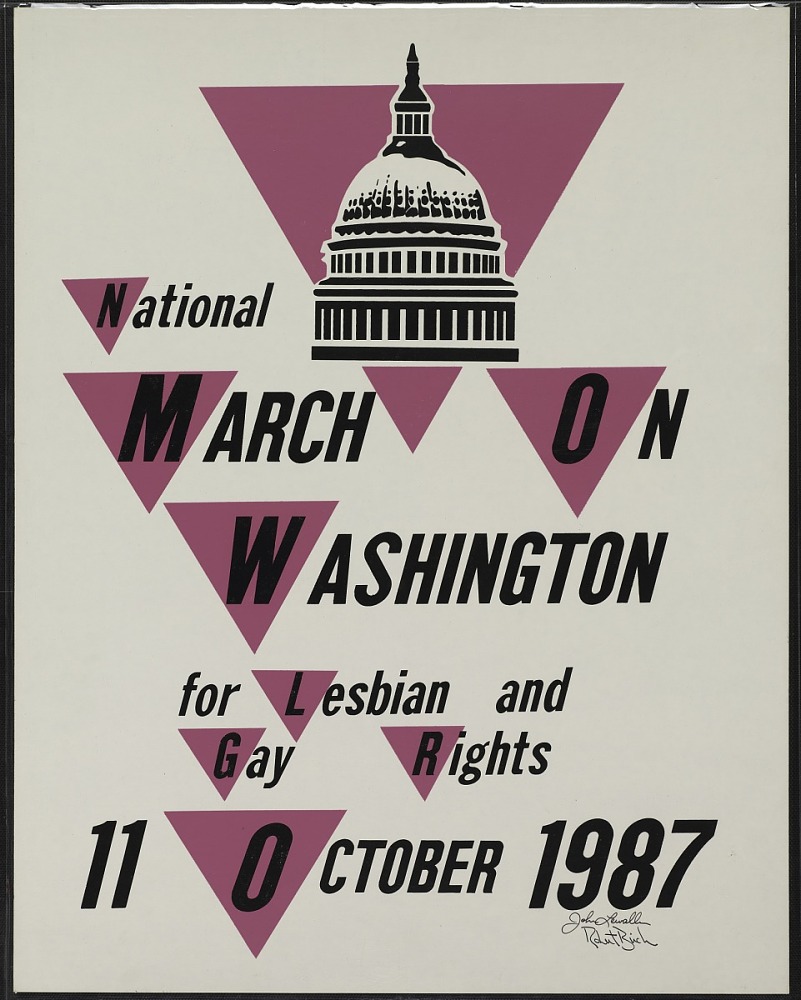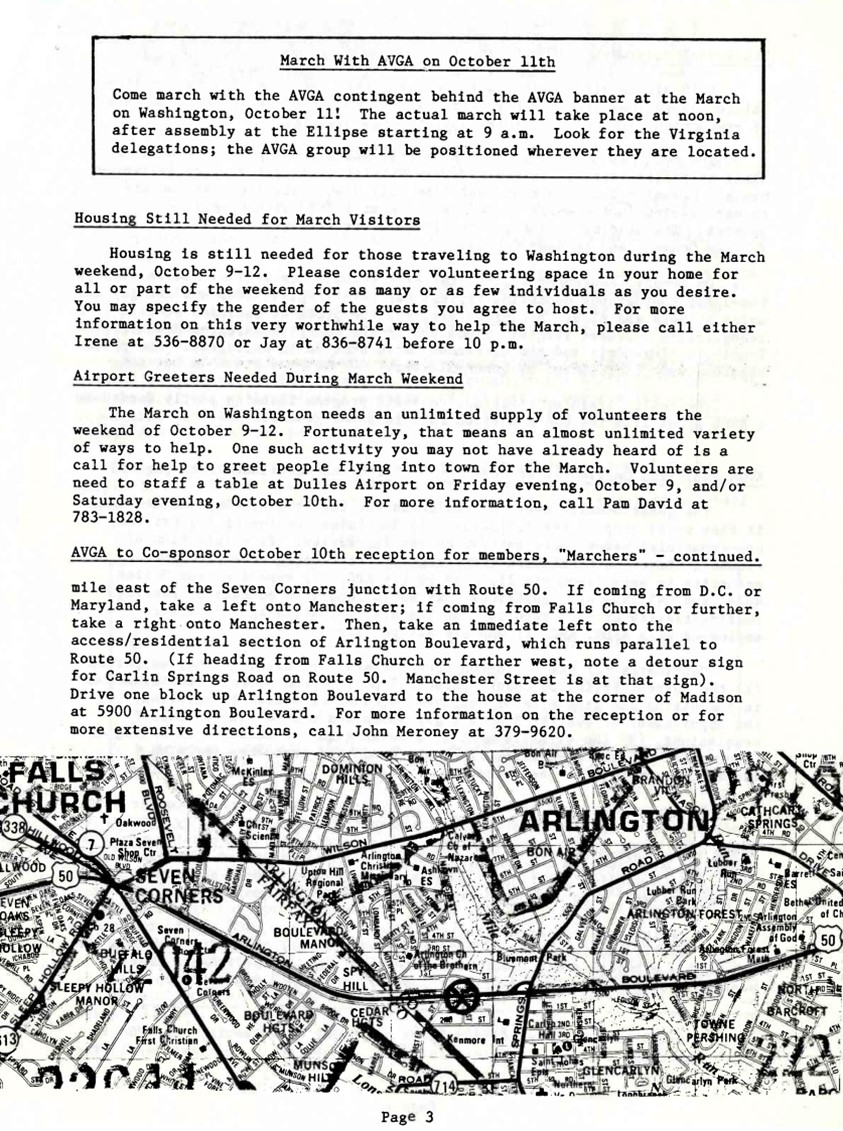October is LGBTQ+ History Month
October 11 is National Coming Out Day, celebrated on the anniversary of the Second National March on Washington for Lesbian and Gay Rights - also known as “The Great March,” which took place on October 11, 1987.
The March was organized to draw national attention to LGBTQ+ issues and to demand civil rights and protections for LGBTQ+ individuals. It followed the first National March on Washington for Lesbian and Gay Rights that took place in Washington, D.C., on October 14, 1979. The desire for the second rally was provoked by the escalating AIDS epidemic and by the Ronald Reagan administration's lack of acknowledgment and intervention in the crisis. Marchers also conducted acts of civil disobedience at the Supreme Court in protest of the 1986 ruling in Bowers v. Hardwick, which upheld the constitutionality of state sodomy laws that criminalized sex between two consenting men.
Poster used in the Second National March on Washington for Lesbian and Gay Rights in 1987. Credit to Vernon C. Mitchell. From the National Museum of American History.
The Great March involved several days of planned events, including a mass wedding and protest at the Internal Revenue Service, and talks by several speakers, such as Cesar Chavez, Whoopi Goldberg, Eleanor Smeal, and Jesse Jackson. The NAMES Project AIDS Memorial Quilt was displayed for the first time on the National Mall. At that time, it included 1,920 panels and covered a space larger than a football field. The Great March also marked the first time that ACT UP (The AIDS Coalition to Unleash Power) received national press coverage.
For Love of Life: The 1987 March on Washington for Lesbian and Gay Rights. Recorded by Cheryl Spector. Rainbow History Project, March 31, 2022.
Although sources vary, it is estimated that over half a million people attended the Great March. Among them were at least 50 Arlington residents who marched down Pennsylvania Avenue together behind the Arlington Virginia Gay Alliance (AVGA) banner. AVGA – which changed its name in the late 1980s to the Arlington Gay and Lesbian Alliance and is now also known as Equality NoVa – was formed in 1981 to address equal rights issues for LGBTQ+ citizens from a local and state perspective. In the 1980s, AVGA members organized candidate forums, helped educate Arlington law enforcement about the LGBTQ+ community, and were involved in local AIDS activism.
About a month before the Great March, on September 15, 1987, the Arlington County Manager’s Citizens Advisory Committee on AIDS held its first meeting. One of its key members was John Whitener, who also served as chairman of the AVGA Government Affairs Committee.
Members and leadership in the AVGA were tirelessly dedicated to organizing in preparation for the Great March. In October, they co-sponsored a housing clearinghouse to provide Virginia activists with a place to stay during the weekend of the March. They distributed press releases and forms to LGBTQ+ organizations and publications throughout the state to spread awareness and support for marchers. They also organized airport greeters to staff a table at Dulles Airport on October 9th and 10th to welcome and assist marchers from out of town.
Page from the Arlington Virginia Gay Alliance Newsletter, October 1987, including plans surrounding the Great March and a map with John Meroney and Jon Larimore’s house marked for the October 10 reception.
On October 10, AVGA partnered with the Alexandria Gay Community Association (AGCA) to host a special reception to welcome fellow Virginians who had traveled from throughout the state to attend the March. The reception was held at the home of former AVGA president John Meroney and member Jon Larimore, who lived together on Arlington Boulevard. More than 100 people attended the reception, sharing food and building relationships while collaborating to promote civil rights for citizens in the Commonwealth.
National Coming Out Day is a commemoration of the AVGA members, their allies, and other Arlington citizens who gathered on the Ellipse under cloudy skies on October 11, 1987, to march for LGBTQ+ rights. Because of their activism, National Coming Out Day was established to uplift those who proclaim their LGBTQ+ identities and continue to fight for LGBTQ+ liberation.
Works Cited
- Arlington Gay and Lesbian Alliance. “History.”
- Arlington Virginia Gay Alliance, Chris De Joy, and Fred Parris. “Arlington Virginia Gay Alliance Newsletter, 1987 October.” Rainbow History Project Digital Collections.
- Arlington Virginia Gay Alliance, Chris De Joy, and Fred Parris. “Arlington Virginia Gay Alliance Newsletter, 1988 January.” Rainbow History Project Digital Collections.
- Cheryl Spector. For Love of Life: The 1987 March on Washington for Lesbian and Gay Rights. Rainbow History Project, March 31, 2022.
- Human Rights Campaign. “National Coming Out Day.”
- Lena Williams. “200,000 March in Capital to Seek Gay Rights and Money for AIDS.” New York Times, October 12, 1987.
- Library of Congress. “U.S. Reports: Bowers v. Hardwick, 478 U.S. 186 (1986).”
- Mark Stein. “Memories of the 1987 March on Washington.” OutHistory, August 2013.
- Megan E. Springate, “LGBTQ Civil Rights in America.” In LGBTQ America: A Theme Study of Lesbian, Gay, Bisexual, Transgender, and Queer History. National Park Service, 2016.
- National AIDS Memorial. “About the Quilt.”
- Vernon C. Mitchell. Poster used in the Second National March on Washington for Lesbian and Gay Rights in 1987. National Museum of American History.
- Virginia Department of Historic Resources. “Timeline of LGBT History in Virginia and the United States.”
Previous blogposts from the CLH blog LGBTQ+ history:
Help Build Arlington's Community History
The Center for Local History (CLH) collects, preserves, and shares resources that illustrate Arlington County’s history, diversity and communities. Learn how you can play an active role in documenting Arlington's history by donating physical and/or digital materials for the Center for Local History’s permanent collection.
Do you have a question about this story, or a personal experience to share?
Use this form to send a message to the Center for Local History.
Center For Local History - Blog Post Message Form
Do you have a question about this story, or a personal experience to share? Use this form to send a message to the Center for Local History.
"*" indicates required fields

